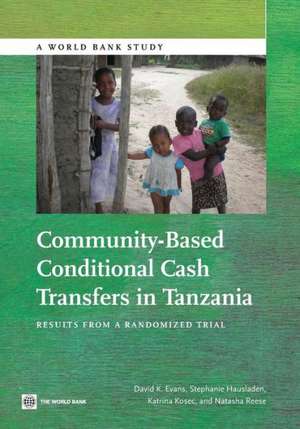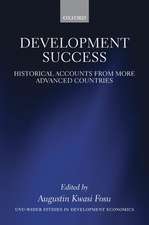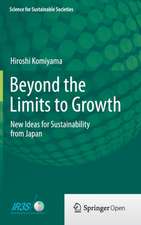Community-Based Conditional Cash Transfers in Tanzania: Results from a Randomized Trial: World Bank Study
Autor David K. Evans, Stephanie Hausladen, Katrina Kosecen Limba Engleză Paperback – 7 mar 2014
Din seria World Bank Study
-
 Preț: 207.55 lei
Preț: 207.55 lei -
 Preț: 200.52 lei
Preț: 200.52 lei -
 Preț: 240.43 lei
Preț: 240.43 lei -
 Preț: 203.02 lei
Preț: 203.02 lei -
 Preț: 204.37 lei
Preț: 204.37 lei -
 Preț: 203.23 lei
Preț: 203.23 lei -
 Preț: 201.67 lei
Preț: 201.67 lei -
 Preț: 204.37 lei
Preț: 204.37 lei -
 Preț: 237.55 lei
Preț: 237.55 lei -
 Preț: 203.61 lei
Preț: 203.61 lei -
 Preț: 171.37 lei
Preț: 171.37 lei -
 Preț: 242.17 lei
Preț: 242.17 lei -
 Preț: 173.49 lei
Preț: 173.49 lei -
 Preț: 207.86 lei
Preț: 207.86 lei -
 Preț: 206.13 lei
Preț: 206.13 lei -
 Preț: 168.49 lei
Preț: 168.49 lei -
 Preț: 205.52 lei
Preț: 205.52 lei -
 Preț: 169.85 lei
Preț: 169.85 lei -
 Preț: 232.74 lei
Preț: 232.74 lei -
 Preț: 202.05 lei
Preț: 202.05 lei -
 Preț: 197.97 lei
Preț: 197.97 lei -
 Preț: 203.02 lei
Preț: 203.02 lei -
 Preț: 203.02 lei
Preț: 203.02 lei -
 Preț: 156.62 lei
Preț: 156.62 lei -
 Preț: 117.42 lei
Preț: 117.42 lei -
 Preț: 118.35 lei
Preț: 118.35 lei -
 Preț: 234.50 lei
Preț: 234.50 lei -
 Preț: 328.31 lei
Preț: 328.31 lei -
 Preț: 115.47 lei
Preț: 115.47 lei -
 Preț: 117.42 lei
Preț: 117.42 lei -
 Preț: 158.73 lei
Preț: 158.73 lei -
 Preț: 155.09 lei
Preț: 155.09 lei -
 Preț: 197.97 lei
Preț: 197.97 lei -
 Preț: 168.49 lei
Preț: 168.49 lei -
 Preț: 202.64 lei
Preț: 202.64 lei -
 Preț: 195.04 lei
Preț: 195.04 lei -
 Preț: 196.98 lei
Preț: 196.98 lei -
 Preț: 195.25 lei
Preț: 195.25 lei
Preț: 205.91 lei
Nou
Puncte Express: 309
Preț estimativ în valută:
39.40€ • 41.14$ • 32.54£
39.40€ • 41.14$ • 32.54£
Carte tipărită la comandă
Livrare economică 15-29 aprilie
Preluare comenzi: 021 569.72.76
Specificații
ISBN-13: 9781464801419
ISBN-10: 146480141X
Pagini: 170
Dimensiuni: 178 x 254 x 10 mm
Greutate: 0.34 kg
Editura: World Bank Publications
Seria World Bank Study
ISBN-10: 146480141X
Pagini: 170
Dimensiuni: 178 x 254 x 10 mm
Greutate: 0.34 kg
Editura: World Bank Publications
Seria World Bank Study














